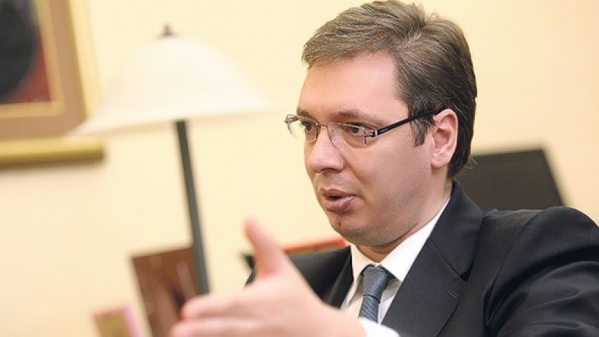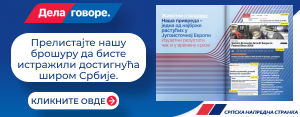
Vucic: We consider both Europeans and Russians among others as our true friends
As part of a series aimed at understanding Russia’s global influence, The Washington Post examined Russia’s low-cost, high-reward strategy in Serbia -- a pivotal Balkan nation that has declared a desire to join the European Union but also counts Moscow as an ally. Although the West is showering far more cash on Serbia, Russian influence is far more penetrating. The Kremlin dominates the front pages of newspapers, Serbian Orthodox priests often echo Russian talking points and Serbian President Aleksandar Vucic makes regular trips to Moscow to meet with Russian President Vladimir Putin. One key issue that has kept the countries close is the Kremlin’s refusal to recognize Kosovo as an independent nation following the former Serbian province’s decision to break away in 2008. Russia has used its U.N. Security Council veto to block efforts to give U.N. membership to Kosovo and to shield Serbia from condemnation. The Post spoke to Vucic this summer about how he balances relations between Russia and the West. Here are some excerpts from the conversation, lightly edited for clarity.
* You’ve been emphasizing a European, Western path for Serbia but also preserving good relations with Russia. If you were a member of the E.U., you would have to impose sanctions on Russia. Is that something you would be ready to do?
- Serbia has not only a regular and normal position but has the only position that it can defend by itself. Which means that we are on our E.U. path, we want to belong to a European type of society. That’s No. 1, something of the biggest significance for us.
And what we want to be a part of is the European Union as an organization of 27, 28 member states, which is the biggest bloc of peace and tranquility. And also, that would help us to keep stability and to keep up reforms on different issues, including the anti-corruption fight, rule of law. That’s what we need.
On the other hand, we have the Kosovo issue, which is interpreted in different ways, but you have Kosovo in all of our chapters in a way. Whatever someone might say, we are overwhelmed with the issue of Kosovo. And if you analyze the polls, the recent polls in Serbia, you are going to see that if one day there would be a referendum on the European future of Serbia, the E.U. path will win. That’s about the rational approach of the Serbian people.
But if there would be the people’s assessment and people’s estimation on the European policy on Serbia, it is slightly different. People immediately connect the European Union to all the pressures that we are facing with Kosovo, and it is the same with Americans. And it is something strange.
And on the other hand, we have Russia, which supports our territorial integrity, which has always been helpful and supportive at the United Nations Security Council and at different institutions and organizations.
We have a very rational approach, although we consider both Europeans and Russians among others as well, as our true friends. That’s very simple. You take everything you can to defend your country’s position and your country’s and your people’s interest.
* Apart from Russian support on the Kosovo issue, what is more attractive about Russia than the West to Serbia?
- Serbs are very much attracted by the Western living standards, the standards of people.
That’s why they like Germans. Because they bring their factories, they bring their plants to this country. They respect them very much. And the way of living is something that is preferable in the West than in the East, no doubt.
Then, some people wanted to stigmatize and to put a seal on our forehead, that we, our people, only our people committed genocide, you know, the only people in Europe to commit genocide after the Second World War. The Russians were on our side at the U.N. Security Council when the others were not.
And people will say okay, they are a close ally, but here is our rational choice and our rational approach that we are going to go to the E.U. It does not mean we are going to spoil our relationship with Russia. But even when we go to Russia, it does not mean we are leaving our E.U. path.
But you know, I am the president of an independent country and we make decisions by ourselves for the benefit and the sake of our people. We are Serbs, we are ordinary citizens of Serbia, we have our own politics and I’m very proud to say that. Of course, we have to obey some rules, to be decent with everybody, but we have our interests. That’s it.
* Ordinary Serbs do not necessarily seem to realize the degree to which trade is focused on Europe versus Russia, and I have to say, looking at the Serbian media, I think I understand why. You see Vladimir Putin on the covers of tabloids. There is a big orientation towards Russia. And I wanted to ask why that is.
- I’ll try to explain it a very rational way, speaking about all the events from the 1990s, including 1999 [when NATO bombed Serbia]. And all the pressure that we were facing after 2000 on the Kosovo issue. I don’t know what else. These are the reasons.
I’ll put it this way. If you ask my parents, particularly my father or my brother, they would have thousands of words of remarks on the European Union’s behavior in Serbia. And after all, if you ask the question whether we should continue, whether we should carry on with our E.U. path, you always get the same response. [Yes.]
It is very difficult to tackle people’s sentiments and people’s emotions. But this is our job to do it, to do everything in a very rational and realistic way.
Our country, our Serbia, is on its E.U. path. Would we like to preserve the best possible relationship with Russia? Yes, we would. Are we going to join NATO or not? No, we are not interested in that. Do we have a good relationship with NATO? Yes, we do. Through [Partnership for Peace] programs, through all the other programs, but we are not willing to join NATO.
* What is the role Sputnik and of Russian media here?
- Sputnik became, I think, a relatively reliable source of news, if I’m not mistaken. I do not know, to tell you the truth. I am not sure. They work freely here and that’s it. There is BBC in Serbian, as well. There is N1. There are media owned by people from different countries and that kind of diversity.
source: The Washington Post

